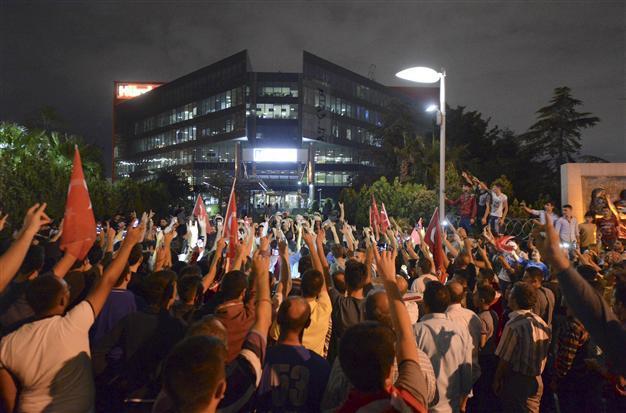‘Alarming’ decline in media freedom as Turkey fights militants
ANKARA – Agence France-Presse

Demonstrators shout nationalist slogans during a protest in front of the headquarters of the Hurriyet daily newspaper in Istanbul, Turkey, September 8, 2015. Reuters Photo
When suspected Islamic State of Iraq and the Levant (ISIL) jihadists organized a deadly attack on Turkish activists in Suruç on the Syrian border in July, respected newspaper commentator Kadri Gürsel responded with a tweet critical of President Recep Tayyip Erdoğan.
“It’s embarrassing that foreign leaders call the person who is the number one cause of ISIL terror in Turkey to present their condolences for Suruç,” he tweeted.
Gürsel was referring to allegations – vehemently denied by Ankara – that Erdoğan had supported jihadists in Syria in the hope they would oust the Syrian regime.
The response by his newspaper Milliyet – long seen as a respected and mainstream title – was swift and merciless.
Gürsel, who started working for the paper in the 1990s and began his column in 2007, was fired the same day.
The paper said Gürsel’s comments were journalistically unethical and violated its editorial principles.
His case highlights the problems faced by the Turkish opposition press as Erdoğan pushes a relentless offensive against the outlawed Kurdistan Workers’ Party (PKK) and prepares for snap legislative elections on Nov. 1.
Turkey already has a history of cracking down on media freedoms and was the world’s top jailer of journalists in 2012 and 2013 before improving slightly, according to the International Committee to Protect Journalists.
The situation appears to have again deteriorated in recent weeks with the arrests and deportations of international journalists, attacks on daily Hürriyet and a police raid on a holding company that owns opposition media.
“Erdoğan wants to restore his party as the single party of government,” Gürsel told Agence France-Presse.
“To achieve his goal, he is seeking to silence remaining critical voices in traditional media,” he said.
Karin Deutsch Karlekar, director of free expression programs at PEN American Center, agreed.
“As the elections approach, the space for media to operate freely continues to shrink at an alarming rate,” she told AFP.
Milliyet is owned by the Demirören Group, one of Turkey’s largest conglomerates with interests in energy, construction and media. Its chief, Yıldırım Demirören, is widely seen as close to the president.
Mehveş Evin, another pro-opposition Milliyet columnist, was fired last month.
“I will not surrender. I will keep on writing!” she tweeted.
At least 140 journalists have been fired over the last couple of months, according to a report from the EU-funded Press for Freedom Project.
“There is no sign of hope. Press freedom is declining in Turkey,” said Yusuf Kanlı, a columnist for the Hürriyet Daily News.
Meanwhile, the pro-government Star newspaper’s columnist Cem Küçük accused leading Hürriyet columnist Ahmet Hakan of backing the PKK, and media outlets perceived to show similar backing earn routine accusations of treachery.
“We could crush you like a fly if we want. We have been merciful until today and you are still alive,” Küçük wrote on Sept. 9.
Hürriyet’s Istanbul headquarters was attacked twice last week by pro-government demonstrators who accused the paper of misquoting Erdoğan.
It came after the president repeatedly criticized the Doğan Media Group, which owns Hürriyet and does not always toe the government line.
In another incident earlier this month, Turkish police swooped on the Ankara-based offices of Koza-İpek media group – close to Erdoğan’s political rival, the U.S.-based Muslim cleric Fethullah Gülen – after a report allegedly documenting weapons shipped from Turkey to ISIL in Syria.
And on Sept. 14, authorities raided the premises and detained the managing editor of the magazine Nokta for a cover satirizing Erdoğan.
The government, however, denies meddling with Turkey’s press freedom and Erdoğan has repeatedly stated that the country has “the freest press in the world.”
But Korkmaz Alemdar, professor of communications, said “we cannot talk about media freedom” in Turkey under Erdoğan’s Justice and Development Party (AKP), in office since 2002.
He added that the general public was often unaware of critical media sites and many took their information mostly from national television channels.
International media have also been affected.
Dutch journalist Frederike Geerdink was deported this month after being detained during clashes between PKK militants and Turkish security forces, while the BBC was accused by Ankara of PKK propaganda over a recent report on the group’s female fighters.
Last month, Turkish authorities arrested two British reporters and their Iraqi translator working for U.S.-based VICE News on terror charges. The Britons were deported but translator Mohammed Ismael Rasool is still being held.
The European Union voiced concern about the arrests and warned that any country seeking to join the bloc “needs to guarantee respect for human rights, including freedom of expression.”
Turkey is a long-standing candidate for membership of the 28-nation EU, beginning its accession talks in 2005, but the process has been bogged down for years over complaints on its human rights record.
“The repression of press freedom in Turkey has continued systematically since 2008,” Gürsel told AFP.
“This latest wave is only a new chapter towards the full submission which is the ultimate target,” he added.
